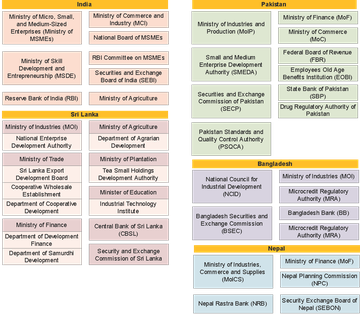Initiatives to Support MSMEs
Impressed by the young entrepreneurs Tashi exclaimed.
“All of your knowledge inspired me. You all raised really important points with researched examples. I’m impressed., I think you all understand the climate risks and how it plays out at the local level. I hope you have seen how climate-induced environmental disruptions will directly affect the day-to-day operations of MSMEs working in various sectors. Yesterday, Lalima and I also discussed how significant MSMEs are to a nation’s economy. So, do you think the governments and relevant institutions are taking adequate steps to make MSMEs climate resilient?”

Tashi gave some time for all four to think. Finally, Baisali spoke out.
“I know some government bodies that may be relevant, such as the Ministry of Micro, Small, and Medium-Sized Enterprises (Ministry of MSMEs) in India, the Ministry of Industries (MoI) in Sri Lanka, the Ministry of Industries and Production (MoIP) in Pakistan, Ministry of Industries (MoI) in Bangladesh and Ministry of Industries, Commerce, and Supplies (MoICS) in Nepal.”

“Correct, and there are other relevant institutions as well. Here is a chart that summarizes the relevant institutions for policies and regulations for MSMEs based on data from Asian Development Bank’s Asia Small and Medium-Sized Enterprise Monitor 2021. However, do note that the definition of MSMEs varies from country to country.”

Tashi opened a chart on his tablet.

Figure 3 Institutions responsible for policies and regulations of MSMEs
Data obtained from (Asian Development Bank, 2021)
Tashi carefully steers the discussion.
“Now the question is, what initiatives and focus are being given to aspects of climate resiliency for MSMEs?”

Silence ensues. Gauging that Tashi has led all four to ponder the question, he takes out his notebook and begins the conversation.
“Well, let’s take Bangladesh as an example. One of the eleven strategic goals mentioned in the Small and Medium Enterprises (SME) Policy 2019 is the “Development of capacity for establishing environment-friendly SME industries and industrial waste management.” If you go to the specific section of the document, one of the strategies is to encourage SMEs to establish environment-friendly industries and provide necessary training and improve and increase the use of environment-friendly industrial technologies. So, maybe the push for renewable energy can be clubbed under this policy?
Similarly, one of the twelve strategic goals of the National Financial Inclusion Strategy of Bangladesh 2020-2024 (July 2019) mentions ‘Broaden and deepen financial inclusion of women, the population affected by climate change and another underserved segment of the population.
Likewise, there may be different policies, programs, and schemes designed for MSMEs to support their growth, encourage low carbon transition, and other climate-resilient efforts. However, as you scan through the initiatives being taken for the institutions given above, you’ll find that more needs to be done to make MSMEs climate-resilient respective to their local climate risks.”

“Hmmm…. it's better if we all have a look at the policies and regulations of these institutions across the South Asia region where we intend to work. It will help us gain an understanding of the regional climate initiatives being taken for MSMEs and also can be beneficial to take advantage of any incentive schemes for MSMEs.”

“Exactly! It’s important to know the policies and regulations in the region where you intend to work. There are plenty of resources online.”

Average Rating: ☆ ☆ ☆ ☆ ☆ (0 reviews)

